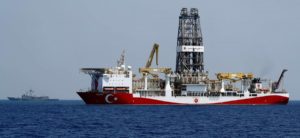Turkey’s bid to increase its share in the oil and gas resources of the eastern Mediterranean is opposed by all stakeholders in the region, as well as by the United States and the European Union. The only exception is the UN-backed Libyan Government of National Accord (GNA), based in Tripoli. The GNA’s support for Turkey is not because of oil and gas, but for the military support it expects from Turkey.
Everything started in 2009 with the discovery of a rich gas reserve of 223 billion cubic metres in Israel’s Tamar gas field. It could relieve Israel of its reliance for energy on neighbouring Arab countries. The discovery opened the eyes of other East Mediterranean countries that have contiguous Exclusive Economic Zones (EEZ) with Israel.
Because of other priorities, Turkey was slow in taking any initiative in this field. Last month, it took a belated initiative by negotiating two memoranda of understanding with Libya; one on military cooperation, the other on the delineation of maritime boundaries.
This article will focus on the maritime boundaries.
Egypt, Greece and the Greek Cypriot administration agreed in 2014 to cooperate in various fields, but mainly in the field of oil and gas exploration. In 2016, a similar agreement was reached between Israel, Greece and the Greek Cypriots. Turkey was left out of both because of its problems with almost all countries of the region.
Turkey’s agreement with Libya came after eastern Mediterranean coastal countries completed the delineation of their maritime jurisdiction areas. Turkey has the longest coast in the eastern Mediterranean, but was left with the smallest maritime space.
The principle of equity requires that Turkey should be allocated a maritime space commensurate with the length of its coastline. To make this thesis valid in all UN conferences on the Law of the Sea held since 1958, Turkey insistently supported without success, the thesis that islands should not have continental shelves. Several Law of the Sea Conventions have in fact recognised that only the archipelagic states – such as Philippines for instance – may have a continental shelf, but not individual islands.
Based on this approach, Turkey negotiated an agreement with the GNA. This agreement is based on Turkey’s thesis that three Greek island – Rhodes, Karpathos and Crete – do not have a continental shelf. Therefore, they only have six miles of territorial waters and outside that is the continuation of the continental shelf of the Anatolian peninsula.
When the continental shelves of these three islands are excluded, Turkey’s continental shelf and its EEZ joins Libya’s EEZ, south of the island of Crete.
There are maximalist approaches on both the Turkish and the Greek sides. For example, retired Colonel Ümit Yalım, former Secretary General of the Turkish Ministry of Defence, persistently raises the question in the Turkish media saying that three-quarters of Crete belongs to Turkey. He says that, according to the 1913 Treaty of London, only one-quarter of Crete was given to Greece and the remaining three-quarters was given to Bulgaria, Serbia and Montenegro. These three countries later relinquished their rights. Therefore, he says, their share went back to its original owner, that is the Ottoman Empire.
However, the Turkish government did not take this thesis into account and negotiated the memorandum of understanding with Libya assuming that Crete belongs to Greece in its entirety.
On the Greek side, the maps made available by its authorities show that the tiny island of Kastellorizo, off the Turkish coast, has also a continental shelf. The island has an area of just 7.1 square km. If it were allowed to have continental shelf, Greece would gain a maritime jurisdiction area 2,000-times bigger than the island itself.
The Turkish-Libyan agreement may have cheered those pushing the Turkish government to take action to protect its rights in the eastern Mediterranean, but the situation is not clearer now with so many actors against Turkey.
Ankara needs to take an urgent action to improve its relations with all its neighbours and find a middle ground protecting the national interests of all parties as much as possible.
© Ahval English
The views expressed in this column are the author’s and do not necessarily reflect those of Ahval.




